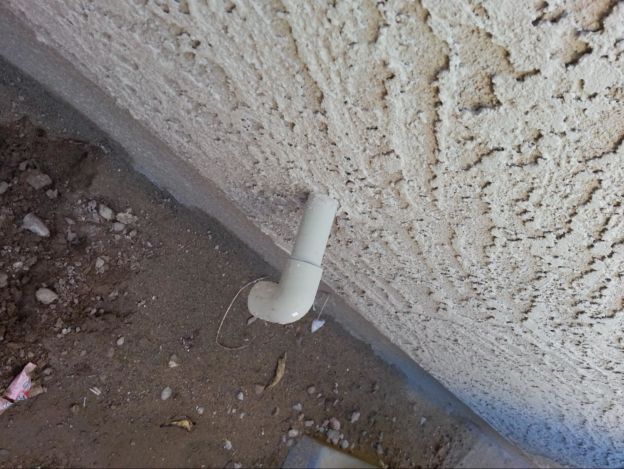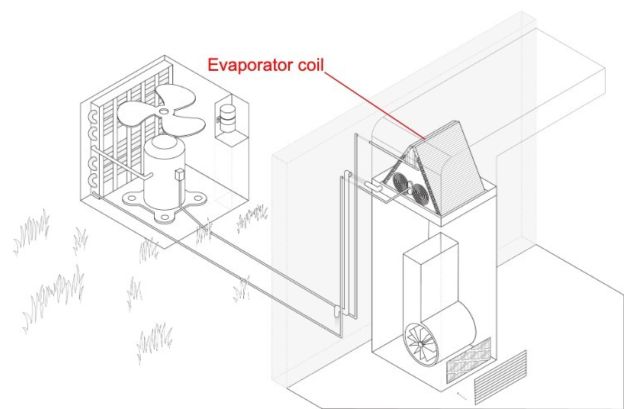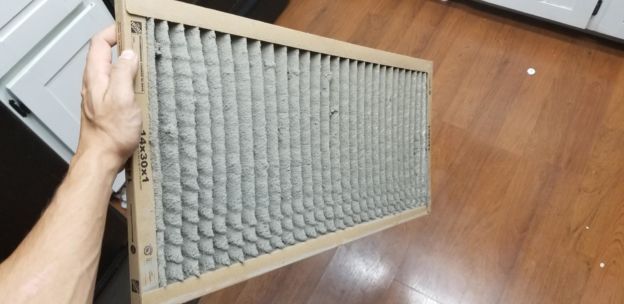Concerned about water leaking around your heat pump?
Don’t worry—we’ll help you troubleshoot this messy heat pump issue.
The first thing you’ll want to determine is where the water is leaking from:
- If a small amount of water is leaking around the outdoor unit, your heat pump may be in defrost mode (if it’s winter) or it could just be an especially humid day (if it’s summer).
- If the water is leaking around the indoor unit, you may have a drain problem or a frozen evaporator coil.
Jump to the section below that describes the location of your water leak for more information about how to fix the problem.
Want a professional to repair your heat pump? Our trustworthy technicians are standing by, ready to help!
Why your heat pump is leaking water around the outdoor unit
Possible cause #1: Your heat pump is in defrost mode
If it’s winter and you notice a small amount of water around your outdoor unit, your heat pump may be in defrost mode.
We’ll explain.
When outdoor temperatures drop below 32° F, frost or ice can form on the outdoor coils of your heat pump, which can prevent the system from warming up your home properly. To prevent a thick layer of ice from covering the coils, your heat pump will automatically initiate a defrost cycle to melt the frost/ice.
During or after the defrost cycle, you may notice a pool of water (the melted ice) around the outdoor unit for a brief period of time before the water freezes over.
How to tell if your heat pump is in defrost mode
You’ll know your heat pump is in defrost mode if the outdoor and indoor fans have stopped running, but you still hear noise coming from the outdoor unit. You may also see vapor coming from the outdoor unit for a minute or so. A typical defrost cycle lasts anywhere from 5 to 10 minutes, and usually repeats every 30 to 90 minutes, depending on your heat pump model.
When to call a professional
Since defrost mode is a normal part of heat pump operation during the winter, there’s no need to be concerned about the pool of water. That said, if you notice reduced heat or the defrost cycle takes longer than 10 minutes or is repeating with increased frequency, you should contact a professional to inspect your heat pump and make sure it’s working properly.
Possible cause #2: It’s an especially humid day
If it’s a hot, humid day, it’s normal to see some water around the outdoor unit while the heat pump is cooling your home.
The water is most likely just drained condensation, which is formed when humid air comes into contact with cold copper coils inside the heat pump. This condensation is carried outside of your home via a condensate drain line (pictured below).

The condensate drain line
Texas summers are naturally humid, so it’s perfectly normal to see a pool of water under the outdoor drain line. In fact, in cooling mode, heat pumps can drain as much as 20 gallons per day via the condensate drain line.
Why your heat pump is leaking water around the indoor unit
Possible cause #1: A drain problem
Often, if water is leaking around the indoor unit of your heat pump, it’s related to a drain issue. The most common drain problems include:
- A rusted drain pan: A drain pan collects the condensate that drains from the indoor unit. If the drain pan is rusted, water will leak out around the base of the indoor unit.
- A clogged condensate drain: In cooling mode, your heat pump drains condensate outside of your home via a PVC pipe (called the condensate drain). However, if the condensate drain gets clogged with dirt or debris, water will back up into the drain pan. If enough water backs up into the drain pan, water will overflow around the indoor unit.
To learn more about these problems in more detail, please refer to our blog, “Why Is My AC Leaking Water Inside My Home? A Texas HVAC Pro Explains.”
Solution: Contact a professional to inspect the drain pan for leaks and the condensate line for clogs.
Possible cause #2: A frozen evaporator coil
Another cause of water leaking around the indoor unit is a frozen evaporator coil. The evaporator coil is located in the indoor unit of your heat pump and it helps to heat or cool your home, depending on the season.

The evaporator coil, located in the indoor unit of a heat pump
In cooling mode, a cold liquid substance called refrigerant passes through the evaporator coil to absorb heat from your home’s warm air. However, if the refrigerant gets too cold, ice will start to form on the evaporator coil. When the heat pump stops actively cooling your home’s air, the ice will start to melt. All of the extra water from the melted ice can overflow from the drain pan, which could explain the pool of water around your indoor unit.
What causes the evaporator coil to freeze over
- A dirty air filter or closed vents restrict the amount of warm air that can blow over the evaporator coil, which can cause the refrigerant to get too cold. If the refrigerant gets too cold, ice will form on the evaporator coil.

A dirty air filter
- A leak in the refrigerant lines can ultimately lower the temperature of the refrigerant circulating throughout the heat pump. If the temperature of the refrigerant is too low, the evaporator coil will start to freeze.
Solution: Make sure your air filter is clean and that your vents are open, even in unused rooms. This will allow proper airflow into your heat pump and prevent the refrigerant from getting too cold.
If your filter is clean and the vents are open but the pool of water persists, you may have a refrigerant leak. A professional will need to find the source of the leak, repair it, and then add the correct amount of refrigerant to your system.
Need a heat pump repair from a trusted San Marcos tech?
Our trained technicians can quickly find what’s causing your heat pump to leak water and fix the issue. When you hire Reliable Air, you can count on honest pricing and exceptional customer service for every heat pump repair.
Visit our heat pump repair page to learn more about what to expect when you hire us.

